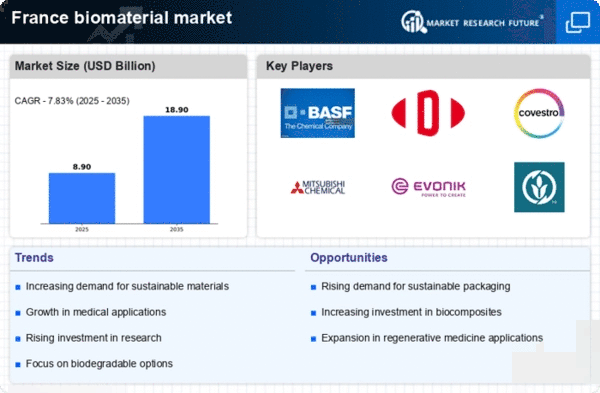Government Support and Regulations
Government initiatives and regulations play a crucial role in shaping the biomaterial market in France. The French government has implemented various policies aimed at promoting the use of renewable materials and reducing plastic waste. For instance, the introduction of stricter regulations on single-use plastics has encouraged businesses to explore biomaterials as viable alternatives. This regulatory environment is expected to foster growth in the biomaterial market, with an anticipated increase in market size by 15% over the next few years. Such support not only enhances the competitiveness of local companies but also aligns with broader European Union goals for sustainability and environmental protection.
Rising Demand for Eco-Friendly Materials
The increasing awareness regarding environmental sustainability is driving the biomaterial market in France. Consumers are progressively favoring products that are biodegradable and have a lower carbon footprint. This shift in consumer preference is reflected in the market, where the demand for eco-friendly materials is projected to grow at a CAGR of approximately 12% over the next five years. Companies are responding by innovating and developing new biomaterials that align with these values. The biomaterial market is thus witnessing a surge in investments aimed at research and development of sustainable alternatives to traditional materials, which could potentially reshape the landscape of various sectors, including packaging and textiles.
Growing Interest in Biodegradable Plastics
The shift towards biodegradable plastics is becoming a significant driver for the biomaterial market in France. As consumers and businesses alike seek alternatives to conventional plastics, the demand for biodegradable options is surging. This trend is supported by increasing environmental concerns and the desire for sustainable packaging solutions. The biomaterial market is responding to this demand, with projections indicating a growth rate of 10% annually for biodegradable plastics. Companies are investing in research to enhance the performance and affordability of these materials, which could lead to wider adoption across various sectors, including food packaging and consumer goods.
Technological Advancements in Biomaterials
Technological innovations are significantly influencing the biomaterial market in France. Advances in material science and engineering are enabling the development of new biomaterials with enhanced properties, such as improved strength, flexibility, and biodegradability. These innovations are particularly relevant in sectors like healthcare, where the demand for biocompatible materials is on the rise. The biomaterial market is likely to benefit from these advancements, as they open up new applications and markets. For instance, the integration of nanotechnology in biomaterials could lead to breakthroughs in drug delivery systems, potentially increasing the market's value by 20% in the coming years.
Collaboration Between Academia and Industry
The collaboration between academic institutions and industry players is fostering innovation within the biomaterial market in France. Research partnerships are increasingly common, as universities and companies work together to develop new biomaterials that meet market needs. This synergy is crucial for advancing the biomaterial market, as it facilitates the transfer of knowledge and technology. Such collaborations are expected to yield significant advancements, potentially increasing the market's growth rate by 18% over the next few years. By leveraging academic research, companies can accelerate the development of innovative solutions that address both consumer demands and environmental challenges.

















